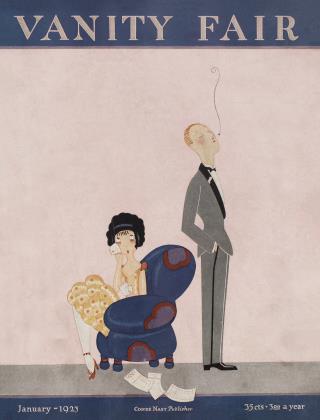Sign In to Your Account
Subscribers have complete access to the archive.
Sign In Not a Subscriber?Join NowThe Fashions and Pleasures of New York
The Dinner Guest Who Makes Conversation
JOHN McMULLIN
THE after dinner speaker—the wit, is a very rare person. When he is present a dinner party always goes. The other guests need not make conversation, or even make an effort to that end, because conversation is automatically created for them and the dullest is drawn into the discussion. However, a hostess cannot always count on entertaining a wit so the laurels must fall to the person present who is best equipped in small talk to start the ball of conversation rolling, Such dinner conversation invariably turns to the topics of the day. It is generally the latest play or book that is discussed and argued rather than the next move in international diplomacy. In the London drawing room, the dinner conversation turns to politics. In New York it turns to plays. It may be a little discouraging to have the person next one at dinner ask for the hundredth time that season "Have you seen such and such a play?" as an opening wedge to conversation. But horrors, if one has not seen it and is unable to answer! Then all is over before it has begun. It behooves one to have seen that play, because in America it is the basis for starting a dinner convernation, and from there, one may go on to books, the latest picture view, critics, and even international politics. But it all starts with plays.
This season, so far, the dinner guest whose conversation is not doomed to failure at the start, must have witnessed John Barrymore's Hamlet, Merton of the Movies, Loyalties, Seventh Heaven, La Tendresse, 'Rose Bernd, The Old Soak, The Torch Bearers and of course the Ziegfeld and Greenwich Village. Follies, as well as the Music Box Revue. The bombardment of the dinner partner is bound to come from this direction. It may well be pride that makes the subject of the theater so dear to our hearts at the American dinner table, for certainly no where in the world today is the theater so interesting as in New York. In London last season tjiere were scarcely three plays worth seeing. Today there are some twelve or more plays in New York no one should miss, By'these a successful dinner party stands or falls. One dare not go out to dinner the night after a great opening without being equipped to enter the arena of criticism If one has not been to that particular first night, all chance of holding the floor is lost and it is a clever person who can steer the conversation back to his own subject.
Plays, however, are not the only subject that one should be up on. There are the new books and the book reviews to be gone over, and the artist's picture views arc also coming on thick and fast just now. At galleries like Kingore's, Bourgois', Anderson's, Montrose's, Scott and Fowles' and the little gallery down at W'anamakers, there are the choicest examples of contemporary creative work, the forecast of our ideas on decoration for tomorrow, A periodical tour of these galleries is one way of keeping abreast of the times, Strangely enough there really are still people who have not yet become movie fans. But every year one lives to discover new pleasures. It is really very odd that in this day and generation there are those who have not discovered the pleasure to be derived from the movies. Of course only the artists who are attempting to make of the screen something other than a burlesque or a sensation are to be considered. In such pictures as Robin Ilood, aside from Douglas lairbanks' exceedingly fine performance, the photographs and the beauty of the settings are enough to hold the observer spellbound. Nazimova's Salome, which is at the moment struggling under the heavy hand of the censor, preserves all the beauty and tragedy that Beardsley and Wilde gave it. That now famous story If Winter Comes is about to be shown in a beautiful English setting. Knoblock has just gone back to California with Douglas Fairbanks to give another legend immortal life. These and other facts contribute interest to the movies for even the most intellectual.
When one considers that the movies have inaugurated a "continual performance" which is always going on just around the corner, it brings a realization of the pampered age we live in. A half hour in a picture palace has the power to carry one away to the shores of the South Sea Islands or the Court of St. James, What luxury this would have been to the world a hundred years ago. Yet today we take it so lightly and criticize it so severely. The "Plaza" movie house at 59th Street has become a rendezvous for the debs and their beaux. They pack the house of a Sunday afternoon and catch up with all the big pictures they may have missed on Broadway. But it must be admitted that society, as portrayed for society on the screen is calculated to make the smartest feel rather shabby in cornparison. The wonder days of the screen have only just begun and the development of the thing is fascinating to watch. One's weekly round of the town ought to include at least one picture, so that, if for no other reason, one can keep up with a modern dinner conversation.
 View Full Issue
View Full Issue












Subscribers have complete access to the archive.
Sign In Not a Subscriber?Join Now